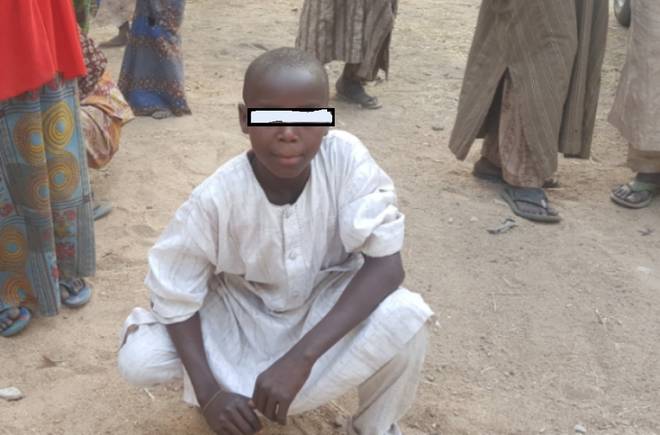A 10-year-old enrolled in Boko Haram training by his dad rejected by family
A 10-year-old boy is rejected by his relations afraid of him after his father enrolled him to train in handling firearms in Sambisa forest. Mohammed Ishaya’s (not his real name) father Aji Usman Marama was a high ranking Boko Haram commander in Bama town of Borno. He fled into Sambisa after Bama was overrun in […]


A 10-year-old boy is rejected by his relations afraid of him after his father enrolled him to train in handling firearms in Sambisa forest.
Mohammed Ishaya’s (not his real name) father Aji Usman Marama was a high ranking Boko Haram commander in Bama town of Borno. He fled into Sambisa after Bama was overrun in 2014.
He is described as an “amir” –or commander—of insurgents. He enrolled his son, then seven years old, in a tsangaya school in Sambisa to be his successor.
An imam, named Usman, who ran the school in Sambisa warned the children not to submit to the Nigerian government and unbelievers. Listed among unbelievers was the military. The teacher insisted the children were doing Allah’s work and reward awaited them in Paradise.
The school had more than 100 child soldiers aged between five and 12 years. It taught the children doctrines behind the sect’s belief and trained them in specialise in dismantling and assembling weapons: AK-47s, anti-aircraft guns, rocket-propelled grenades and to detonate improvised explosive devices and landmines.
Sambisa training
The depth of training Ishaya went through emerged only after. He was assigned to spy on military formations and points in Sambisa.
One day, his imam and trainer went out on a mission and never returned, the 10-year-old recalls.
Ishaya returned from his assignment and found the base in disarray. He met many people “were slaughtered”, he said.
“So I became so afraid because they disobeyed which I felt next time might be my turn,” he told Daily Trust.
“So the following day when I sent out to spy I decided not to return back to Sambisa.”
He wandered through forests for three days before he got to Bama town. Soldiers accosted him, commanded him to raise his arms in the air, removed his clothes. His trainers had kitted him in military fatigues.
He was taken to Garrison in Bama. Several days later, he was relocated to a camp for internally displaced people.
Elated and excited
In his chat with Daily Trust, he said he was among 100 boys his age enrolled in the school.
“Then after we got to camp, I saw many children with military fatigue and my father told that when I grow I would be like them. I felt elated and excited,” he said.
His father handed him over to the teacher. That’s the last time Ishaya ever saw him.
When he wept at the lost contact, his imam warned against crying or trying to escape. The boy was told they couldn’t cry for their missing parents because they khafir (unbelievers).
" If you weep over your parents Allah will judge you at the last day," Ishaya remembers the imam saying. “Every day, during morning congregational prayer, everyone of us would read a verse in the Qur’an, Suratul-Khafir, for four hours, then he would hand over us to the trainers.
"We started the training on how handle guns made from wood, we were taught on how to ascertain close range shooting and long distance shooting, we were also taught how to observe if our enemies (military) about to attacks us. In fact we were taught positioning "means" to defense ourselves and launch attacks on infidels.
“I was trained on how to dismantled and to assembles Ak47, AA and GPMG, even how detonate IEDs and landmines. Our trainers also echo to us that we train you to succeed us because very soon they may die but we must continue from wherever they end. And he did say that if we kill many army and unbelievers, Allah will reward us in heavens.
Then came the mission from which the imam and trainer never returned.
Rejected
Ishaya was among new arrivals brought onto the camp for displaced people last September.
There was no one he knew, a source working with him told Daily Trust. He was confused, perplexed.
His photograph was taken and circulated. It reached Dalori, where Bama indigenes reside in Maiduguri.
An uncle identified Ishaya, accepted the boy was the son of his younger brother, a commander of Boko Haram.
In the same breath, he rejected the boy, and vowed not to allow any of his family have anything to do with him.
Individual nongovernment organisations have attempted to persuade Ishaya’s uncle to accept him but failed.
The uncle believes Ishaya will not forsake his father’s way and his experience in Sambisa may influence his own children.
Ishaya has become well known on the IDCP camp in Bama, the source said.
But is still without any known relative.
"In the last few months we have been able to reunite almost 100 families through dialogue sessions, we are working to restore family core value back to what they used to be,” the source said.
“We are trying to explore all available options. The story of little Ishaya has generated debates in the camp, many with opinion that he should be sent out of the camp but many believe that it was not his fault, Alas! Government must do something to save him.
"I just came back from Bama I saw him, I am particularly concerned about the future of this little boy. I can assure we are doing everything within our reach to make sure get to the root of matter; we are planning to approach Ministry of Women Affairs so that they provide permanent solutions to the problem,” the source assured.
